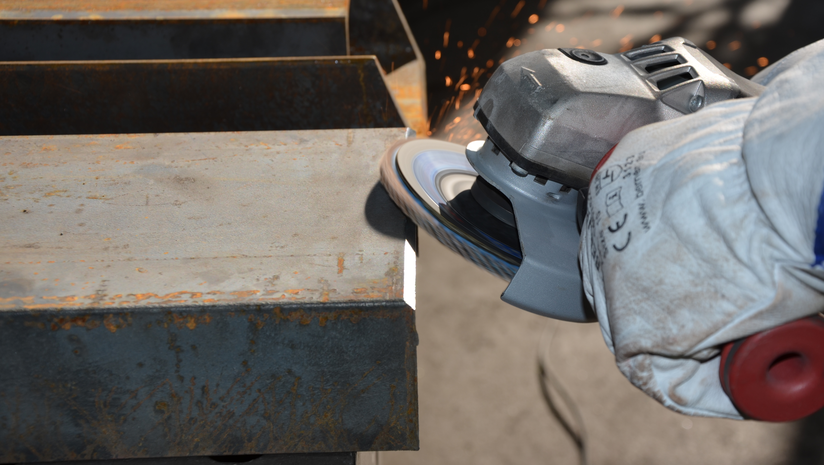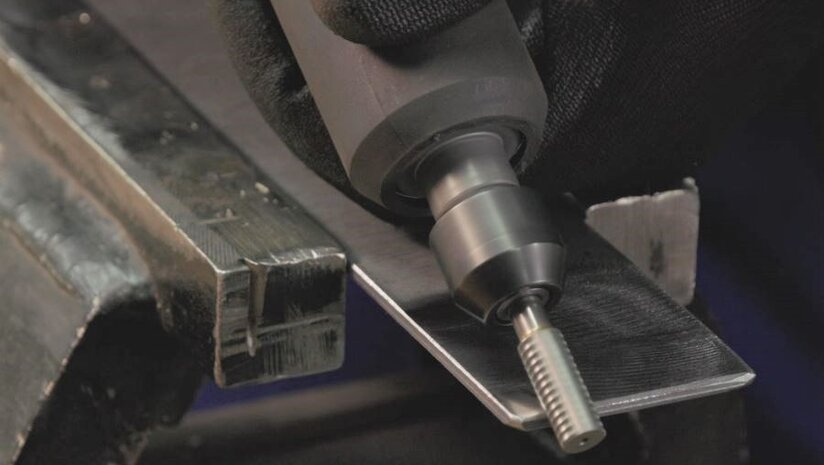
Beveling
If two workpieces are to be welded together, the edge of the workpieces must first be broken by a beveled surface. This is done by machining. The result is a chamfer, also known as a bevel.
What is beveling and
why is it important?
If two workpieces are to be welded together, the edge of the workpieces must first be broken by a beveled surface. This is done by machining. Or in other words, a space is created to accommodate the individual welding layers through which the workpieces are joined together. The bevel can have different shapes. The V-joint, the double V-joint, and the Y-joint are the most common shapes.
Which tool is used for beveling?
The position of the weld, the material of the workpiece, and the types of drives available - the choice of the right tool depends on various factors.
If an angle grinder is available, the beveling can be done with sulfur- and iron-free Osborn flap discs. Flap discs with a conical or straight shape are available. The angle on the workpiece determines the shape of the flap wheel.
If a workpiece made of non-ferrous metal is to be beveled, we recommend an abrasive cloth with a cooling bond as it reduces blue tarnish.

Pictured: Beveling with an Osborn flap disc.
If a straight grinder or air grinder is available, chamfering can be done with carbide burrs. The milling head is made of tungsten carbide-cobalt, the shank of tool steel. Different head shapes and toothings ensure that there is the right solution for every application.
For chamfering, burrs with cross serration (Z6) are the best choice. It ensures high stock removal in a short time. If the surface quality is important, a single tooth (Z3) is recommended. In the shipyard sector, the special shipyard toothing is often used. Compared to the Z6 toothing, it has a 30% higher material removal rate.

Camfering with a carbide burr.
Products for
Beveling.
Diamond Cut Contact Wheel
This wheel is used with coated abrasive sanding belt operations as the carrier of abrasive belts and does not touch the product. Made from rubber sections versus cloth makes this contact wheel a durable and cooler wheel to carry belts. Pressed discs are provided to protect sections, maintain structure, providing firmness and keeping the edges from breaking down. The material allows flexibility when needed for contoured edges and parts as they pass across the abrasive belt surface. Used in automated and manual polishing coated abrasive belting applications. The contact wheel is available in multiple configurations and densities.
Airway Cloth and Sisal Wavering Buff
The combination for dense sisal web and cotton cloth, folded in regular waves, results in a very hard cutting buff, ideal for removing oxidation or other first steps in the polishing process. A very useful tool if there is little or no oscillation.
Cloth Meter Buff
Regular folds with cotton cloth, make this large diameter cloth meter buff an aggressive tool with good compound retention and extended life with controlled indexing. Manufactured in large diameters of 28" to 40". Perfect for buffing with low RPM's to achieve maximum surface speed.
Cloth and Sisal Meter Buff
Regular folds with a sandwich of sisal web and cotton cloth, make this large diameter cloth and sisal meter buff an aggressive tool with good compound retention and extended life with controlled indexing. Manufactured in large diameters of 28" to 40". Perfect for buffing with low RPM's to achieve maximum surface speed. Perfect for robotic polishing cells.
Airway Cloth Sew Pleated Buff
These buffs have a soft buff face with excellent cushion and are ideal for mush buffing highly complex and contoured parts as they rotate thru the buff. The flat, regular pleats offer an excellent surface for retention of Osborn liquid and solid compounds.
Airway Cloth Hot Pleated Buff
These buffs have a soft face with some flexibility and are effective tools for contact buffing and provide excellent cut and color options. The pleats are designed to allow for maximum face coverage and flex during mush buffing. The pre-pleating of the cloth causes edge surface to have a random configuration and the plies do not all lay together. This will help eliminate streaking when no oscillation is possible. This buff makes up a softer wheel to reach into recesses and contours.
Airway Cloth Seamless Buff
The standard ventilated airway buff with no seams in the form, suitable for almost every step in the polishing process. Many qualities of cloth can be selected for high color polishing on flat or contoured surfaces. The irregular folds fixed to a metal clinch ring form a flexible and economical buff with even wear without excess trimming needed. Buffs can be used individually or mounted on a wide shaft, depending on the equipment available.
Airway Bias Sisal Buff (BS)
A compact buff, purely made of sisal web. It is a hard, aggressive tool. Sisal is a natural material, perfect for the polishing process due its excellent compound retention properties.
Blue Bar Color Compound
A full range of solid polishing compounds that can be used individually or in combination to achieve a desired result. All compounds are supplied in many variations and sizes for manual and robotic operations. There is no one size fits all, Osborn prides itself on recommending the best, most efficient solution for every application.
Gray Bar Cut Compound
A full range of solid polishing compounds that can be used individually or in combination to achieve a desired result. All compounds are supplied in many variations and sizes for manual and robotic operations. There is no one size fits all, Osborn prides itself on recommending the best, most efficient solution for every application.
White Bar Color Compound
A full range of solid polishing compounds that can be used individually or in combination to achieve a desired result. All compounds are supplied in many variations and sizes for manual and robotic operations. There is no one size fits all, Osborn prides itself on recommending the best, most efficient solution for every application.
Green Liquid Color Compound
A full range of liquid polishing compounds that can be used individually or in combination to achieve a desired result. Liquid compounds are supplied in many variations of drums, totes, vats and gallon pails for manual and robotic operations. There is no one size fits all, Osborn prides itself on recommending the best, most efficient solution for every application.